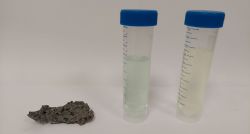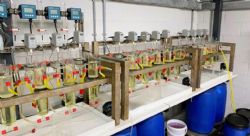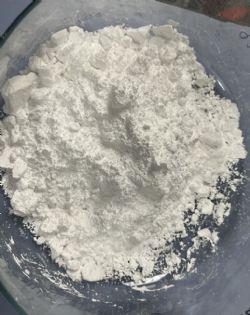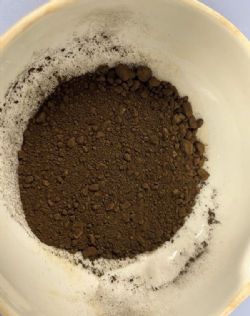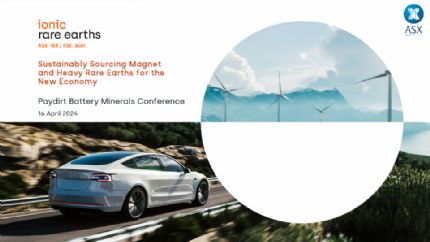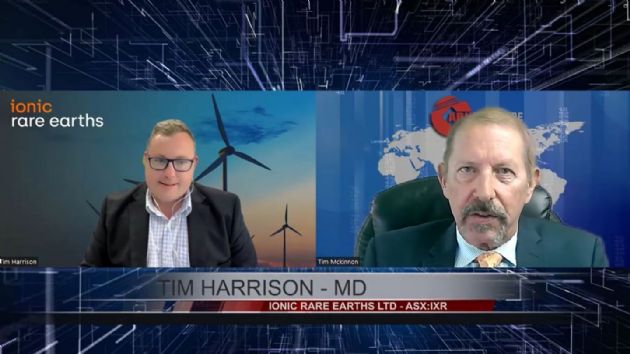BOOST FOR LCM & FORD COLLABORATION AS IONIC TECHNOLOGIES PRODUCES HIGH PURITY TERBIUM OXIDE

IONIC TECHNOLOGIES PRODUCES HIGH PURITY TERBIUM OXIDE
Melbourne, Mar 19, 2024 AEST (ABN Newswire) - Ionic Rare Earths Limited ( ASX:IXR) (
ASX:IXR) ( IXRRF:OTCMKTS) has delivered a boost for its collaboration with leading global automaker Ford Technologies (Ford) and UK-based specialist alloy manufacturer Less Common Metals (LCM), following the successful separation and first production of high purity terbium oxide (Tb4O7) at wholly owned subsidiary Ionic Technologies' Belfast plant.
IXRRF:OTCMKTS) has delivered a boost for its collaboration with leading global automaker Ford Technologies (Ford) and UK-based specialist alloy manufacturer Less Common Metals (LCM), following the successful separation and first production of high purity terbium oxide (Tb4O7) at wholly owned subsidiary Ionic Technologies' Belfast plant.
- Ionic Technologies delivers boost for collaboration with Ford and Less Common Metals, following successful separation of high purity terbium oxide (Tb4O7) at Belfast Pilot Plant; -
- Production demonstrates advanced capability, and capacity to meet growing global demand for HREEs, with around 2.8 kg of Tb4O7 of greater than 99.5% purity produced from early production batches;
- The production of maiden high purity Tb4O7 samples are another first in the magnet recycling industry by Ionic Technologies;
- Ionic Technologies' Demonstration Plant is expected to commence separated magnet REO production on a continuous basis before the end of the month; and
- Ionic Technologies continuing potential supply chain collaborations with rare earth metal, alloy, and magnet manufacturers and global Original Equipment Manufacturers (OEMs).
The production of the maiden terbium (Tb) samples are another first in the magnet recycling industry, highlighting IonicRE's ability to develop a Western supply chain for this key magnet rare earth oxide (REO). The achievement follows IonicRE's successful magnet REO production from Demonstration Plant in 2023, and significant progress with its wind turbine magnet recycling program, as announced to the ASX on 14 March 2024.
Approximately 2.8 kg of high purity (>99.5%) Tb4O7 has been produced. IonicRE's Demonstration Plant is expected to commence separated magnet REO production on a continuous basis before the end of the month.
Ionic Rare Earths' Executive Chairman, Mr Brett Lynch, commented on another successful achievement towards the development of a Western supply chain for energy transition industries:
"This is another significant milestone for IonicRE, solidifying IonicRE as a leader in this sector as we look to build a secure and sustainable Western supply chain for the wind power and other key clean energy industries."
"The capability to produce these elements to high purity, from waste materials generated in the Rare Earth Permanent Magnet supply chain, represents a win for the industry and an opportunity to disrupt how Western markets access heavy REOs, especially dysprosium and terbium of which more than 98% of global supply originates from Chinese producers."
"Given the global demand for secure and traceable heavy REOs, at high purity, we are pleased to demonstrate our capability to separate and purify Tb and Dy with our technology. Dy and Tb remain in consistently high demand, as we are witnessing first hand from the reverse enquiry from the supply chain looking at alternative supply of these elements."
He added: "Heavy REOs are utilised for the production of the highest specification of permanent magnets, and their criticality is plain to see. Demand for Dy and Tb is already outstripping supply from traditional sources with this expected to increase significantly by the end of the decade."
"The recycling capability for these elements, in addition to the excellent progress at Ionic Rare Earths' Makuutu Rare Earths Project in Uganda, show that Ionic Rare Earths and Ionic Technologies are working towards providing resilience, to supply chains as part of a new economy in these strategic raw materials for global decarbonisation."
A first mover in magnet recycling to high purity REOs
Ionic Technologies is a global first mover in the recycling of Neodymium-Iron-Boron (NdFeB) permanent magnets to high purity separated magnet REOs - enabling the creation of sustainable, traceable, and sovereign rare earth supply chains.
During 2023, Ionic Technologies with strong support from the UK Government, constructed a magnet recycling Demonstration Plant and produced initial quantities of high purity (> 99.5%) neodymium (Nd) and dysprosium (Dy) REOs (ASX 19 June 2023).
Additionally, to expand capacity for existing partners, Ionic Technologies is expediting heavy rare earth element (HREE) separation capability to complete Dy and Tb separation utilising the mixersettler pilot plant equipment. This complex separation of HREEs provides supply chain partners with high purity (99.5% or above) heavy REOs to be used in developing grain boundary diffused (GBD) sintered NdFeB permanent magnet production.
Development work has enabled process conditions to be optimised for the production of high purity Dy and Tb oxides, to operate in parallel to the Demonstration plant. Multiple batches of iron-dysprosium-terbium (Fe-Dy-Tb) alloy manufacturing wastes (swarf), with varying composition comprising of high HREE content, has been sourced from our partners and processed. Initial batches operated through the pilot plant have been separated, with approximately 2.8 kg of high purity (>99.5%) Tb4O7 already generated.
Terbium market and importance in magnet production
Terbium, element 65, is classified as a HREE which in excess of 98% of global supply coming from China. Its primary market is for the use in NdFeB permanent magnets for high temperature applications, fluorescent lamp phosphors and defence applications.
The two main rare earths used in NdFeB magnets are Nd and Pr (praseodymium), which can be either added independently or as a mixed NdPr product called didymium. With the exception of lower grade magnets, Nd usually accounts for over two-thirds of the rare earth content in NdFeB magnets.
Up to 30% of the rare earth content in NdFeB magnets can be substituted with other rare earths to meet varying specifications. The key substitutes are Dy and Tb, that allow the magnet to operate at higher temperatures, such as required for electric vehicles (EVs) and direct drive wind turbines.
The relatively low abundance of Dy, and even more so Tb, has underpinned a move to reduce the loading of these elements, however both Dy and Tb remain important in traction motor applications.
Wind turbines for example have significantly reduced the use of Dy and Tb, however market intelligence indicates that Tb is the preferred element in Chinese NdFeB producers as it provides for enhanced performance, while Japanese producers have focussed on Dy. Given a substantially lower abundance of Tb in recent times, market intelligence suggests an increased substitution of Tb with Dy.
Terbium is the highest value and most heavily sought after of the magnet rare earths. Recent pricing of magnet HREEs has seen significant reductions over the past 24 months, with Tb4O7 trading for approximately US$780 per kg, and Dy2O3 trading for approximately US$250 per kg. Recent highs of both HREEs where last seen in February 2022, with prices trading at approximately US$2,400 per kg Tb4O7, and US$490 per kg Dy2O3 at that time.
Demonstration Plant Background
In September 2022, the UK Government's Innovate UK Automotive Transformation Fund Scale up Readiness Validation ("SuRV") program, coordinated by the Advanced Propulsion Centre (APC), awarded a GBP1.72 million grant (A$2.90 million) to Ionic Technologies to build a demonstration magnet recycling plant to produce separated magnet REOs, a first for the UK, as a scale up of successful previous pilot campaigns using the Company's patented technology.
In September 2023, Ionic Technologies announced it had successfully secured additional funding for two Innovate UK CLIMATES grants totalling GBP2 million (A$3.90 million). The successful grant funding submissions centred on two CLIMATES projects:
1. in partnership with LCM and Ford, Ionic Technologies will develop a traceable, circular supply chain of rare earths for application in EV motors within the UK; and
2. in partnership with the British Geological Survey, Ionic Technologies has commenced a feasibility study for a commercial magnet recycling plant in Belfast, UK.
Both projects are progressing and have formally kicked off successfully with InnovateUK.
This production of high purity Tb4O7 forms part of the work stream with LCM and Ford, which is now progressing well and represents a model the Company expects to see replicated through other relationships under development.
Technology Overview
Since its founding in 2015, as a spinout from Queens University Belfast (QUB), Ionic Technologies has developed processes for the separation and recovery of REEs from mining ore concentrates and waste permanent magnets.
The technology developed is a step up in efficient, non-hazardous, and economically viable processing with minimal environmental footprint.
The Company's proprietary technology provides a universal method for the recovery of high purity grade rare earth elements from lower quality and variable grade magnets, to be used in the manufacture of modern high-performance and high specification NdFeB permanent magnets required to support substantial growth in both EV and wind turbine deployment.
Mr Lynch added: "IonicRE is 'walking the talk' by demonstrating our ability to produce these strategic REOs at our facility in Belfast, located in close proximity to wind power generation, deployment and decommissioning facilities.
"The growth ahead for this clean energy industry is enormous, and we are moving as fast as we can to commercialise this technology to enable the circular economy to support it. Our technology is capable of being scaled globally to meet the enormous demand for circular economy value addition to support climate-friendly energy sources such as wind energy."
*To view tables and figures, please visit:
https://abnnewswire.net/lnk/V6S4DM58
About Ionic Rare Earths Limited
 Ionic Rare Earths Limited (ASX:IXR) (OTCMKTS:IXRRF) is focused on developing its flagship Makuutu Rare Earths Project in Uganda into a significant long life, low-cost, supplier of high-value critical and heavy rare earths.
Ionic Rare Earths Limited (ASX:IXR) (OTCMKTS:IXRRF) is focused on developing its flagship Makuutu Rare Earths Project in Uganda into a significant long life, low-cost, supplier of high-value critical and heavy rare earths.
Makuutu is an advanced-stage, ionic adsorption clay-hosted project highlighted by near-surface mineralisation, significant exploration upside, excellent metallurgical characteristics and access to tier-one infrastructure.
The ionic adsorption clay-hosted geology at Makuutu is similar to major rare earths projects in Southern China, which are responsible for the majority of global supply of low cost heavy and critical rare earths, specifically the high value magnet metals (Dysprosium and Terbium) Heavy Rare Earths (>98% originating from ionic clays). Metallurgical testing at Makuutu has returned excellent recovery rates, which provide multiple avenues for a simple process route.
Makuutu is well-supported by tier-one existing infrastructure which includes access to major highways, roads, power, water and a professional workforce.
Rare Earths will play a critical role in the future of clean energy. Rare Earths are a key ingredient in the permanent magnets found in wind turbines and electric vehicles.
IonicRE is led by an experienced and proven team, who have the capabilities to deliver Makuutu into production and realise value for all stakeholders.
| ||
|



